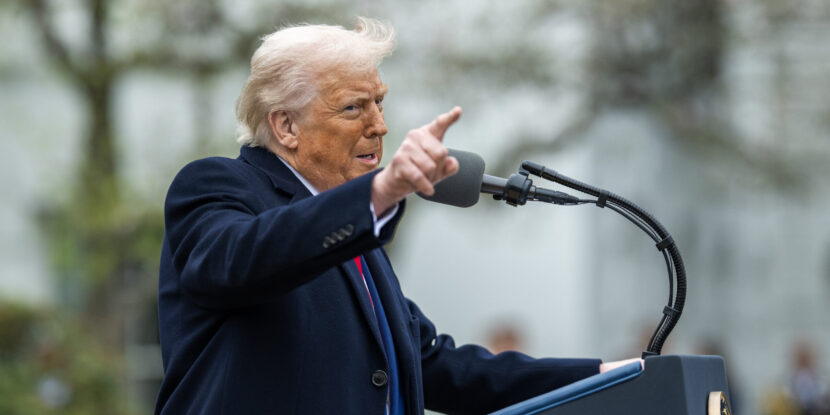
PULSE POINTS:
❓What Happened: Republican support for gay marriage has significantly dropped, according to a recent Gallup poll, but Democratic support remains high.
👥 Who’s Involved: Gallup poll respondents, including Republicans, Democrats, and independents; Supreme Court Justice Clarence Thomas.
Your free, daily feed from The National Pulse.
📍 Where & When: United States; Gallup poll released Thursday, May 29, 2025.
⚠️ Impact: The poll reflects a growing partisan divide on gay marriage and related moral issues, with implications for future legal challenges and cultural debates.
IN FULL:
Support among Republicans for same-sex marriage has dropped sharply over the past three years, according to a new Gallup poll released Thursday. The survey found that just 41 percent of GOP voters now back the legalization of gay marriage, a significant decline from 55 percent in 2021 and 2022.
In contrast, 88 percent of Democrats expressed approval for same-sex marriage, marking a 47-point gap between the two parties—the largest divide recorded since Gallup began polling on the issue in 1996. Among independents, 76 percent voiced support for gay marriage.
Historical data from Gallup shows that in 1996, only 16 percent of Republicans, 33 percent of Democrats, and 32 percent of independents supported the legalization of same-sex unions.
The new poll also highlighted differences in moral perceptions of gay and lesbian relationships. While 86 percent of Democrats said such relationships are morally acceptable, only 38 percent of Republicans agreed—a sharp drop from 56 percent in 2022. Among Americans who attend religious services weekly, 33 percent found same-sex marriage morally acceptable, with only 24 percent deeming gay and lesbian relationships socially acceptable.
The issue of same-sex marriage has also been revisited in legal debates. Justice Clarence Thomas, in his concurring opinion in the 2022 Dobbs v. Jackson Women’s Health Organization decision, called for reconsideration of substantive due process precedents, including Obergefell v. Hodges, the 2015 case that established a constitutional right to gay marriage.
Thomas argued that the legal principle of substantive due process, which has been used to protect unenumerated rights like privacy and same-sex marriage, lacks constitutional grounding. He described it as “an oxymoron that lack[s] any basis in the Constitution,” and emphasized that such decisions should be revisited to determine whether other constitutional provisions might support the rights they claim to protect.
“Substantive due process exalts judges at the expense of the People from whom they derive their authority,” Thomas wrote, adding that it has led to “constitutionally unmoored policy judgments.”

PULSE POINTS:
❓What Happened: President Donald J. Trump blamed Leonard Leo and the Federalist Society for recommending bad judges early in his first term, linking their influence to a U.S. Court of International Trade ruling that attempted to overturn his tariff policy.
👤Who’s Involved: President Trump, the Federalist Society, Leonard Leo, the U.S. Court of International Trade, and the New Civil Liberties Alliance.
Your free, daily feed from The National Pulse.
📍 Where & When: Truth Social platform, with Trump’s post on May 30, 2025, following the trade court’s now-stayed ruling.
🧾Key Quote: “I was new to Washington, and it was suggested that I use The Federalist Society… but then realized that they were under the thumb of a real ‘sleazebag’ named Leonard Leo,” Trump wrote.
⚠️ Impact: Trump warns that the tariff ruling threatens presidential power and America’s economic defense against adversaries like Communist China.
IN FULL:
President Donald J. Trump has blamed the Federalist Society for recommending bad judges to him near the beginning of his first term, when he had few contacts in Washington, D.C. The America First leader explained the situation on his Truth Social platform after the obscure U.S. Court of International Trade attempted to overturn his tariff policy in its entirety in a now-stayed ruling.
“Where do these… Judges come from? How is it possible for them to have potentially done such damage to the United States of America? Is it purely a hatred of ‘TRUMP?’ What other reason could it be?” Trump wrote.
He continued: “I was new to Washington, and it was suggested that I use The Federalist Society as a recommending source on Judges. I did so, openly and freely, but then realized that they were under the thumb of a real ‘sleazebag’ named Leonard Leo, a bad person who, in his own way, probably hates America, and obviously has his own separate ambitions.”
Trump said that Leo, who is still co-chairman of the Federalist Society, “openly brags how he controls Judges, and even Justices of the United States Supreme Court—I hope that is not so, and don’t believe it is!”
The President said he was “so disappointed in The Federalist Society” for its “bad advice… on numerous Judicial Nominations,” warning that if the U.S. Court of International Trade’s tariff ruling is ultimately upheld, it will “destroy our Nation!”
On the prospect of Congress having to approve every tariff, he described a process in which “hundreds of politicians would sit around D.C. for weeks, and even months, trying to come to a conclusion,” hamstringing his ability to act in the American interest against foreign governments.
“If allowed to stand, this would completely destroy Presidential Power—The Presidency would never be the same!” Trump argued, insisting, “The President of the United States must be allowed to protect America against those that are doing it Economic and Financial harm.”
“Hopefully, the Supreme Court will reverse this horrible, Country threatening decision, QUICKLY and DECISIVELY,” he said.
The New Civil Liberties Alliance, which is affiliated with Leo, is among the organizations mounting a lawfare campaign against Trump’s tariff polices, attempting to overturn levies imposed on imports from Communist China.
In 202s, Leo’s Marble Freedom Trust—a 501(c)4 nonprofit that operates as a funding organ for a network of conservative legal and policy groups—effectively received a $1.65 billion contribution through a financial deal executed by Chicago businessman Barre Seid.
READ:
show less

 3 weeks ago
2
3 weeks ago
2








 English (US) ·
English (US) ·